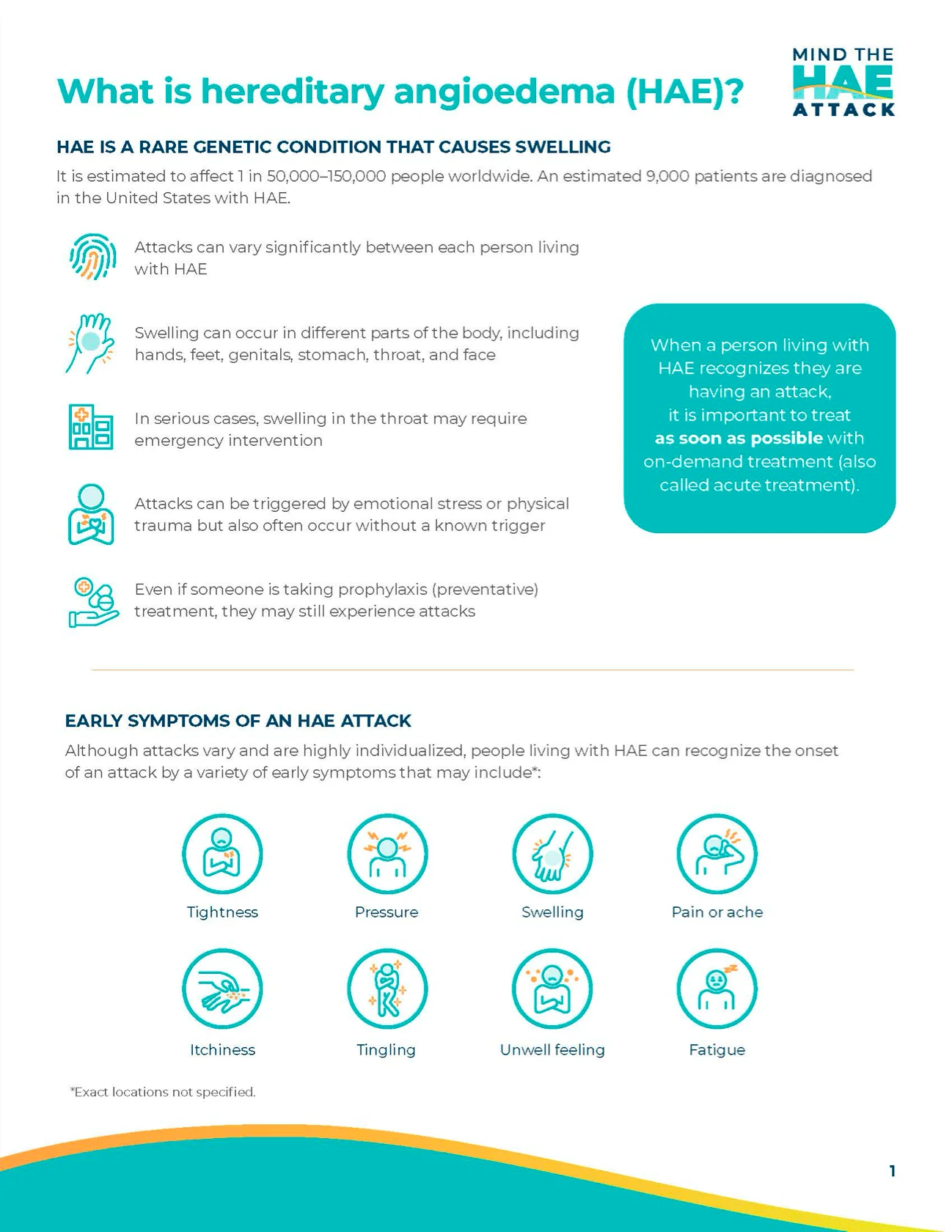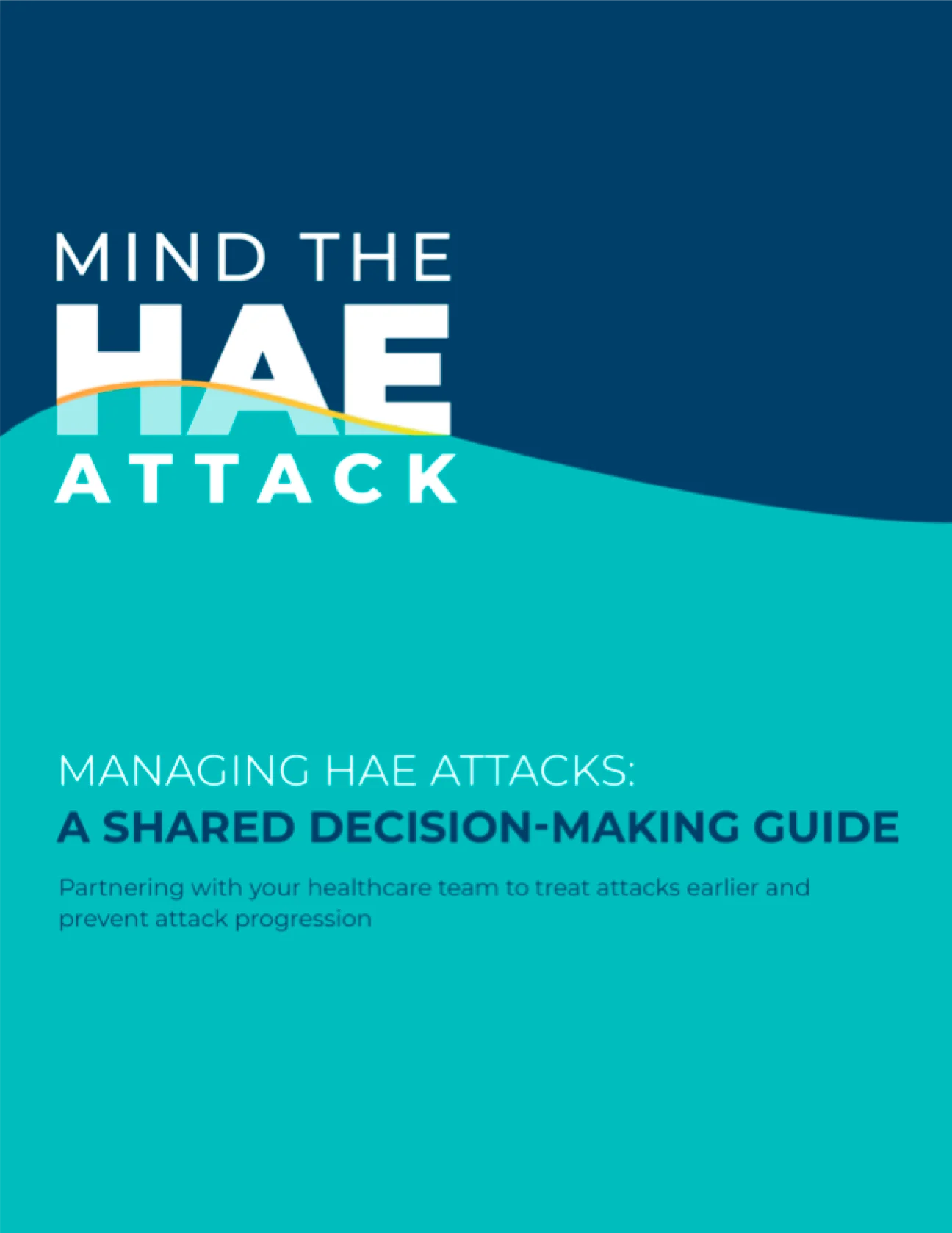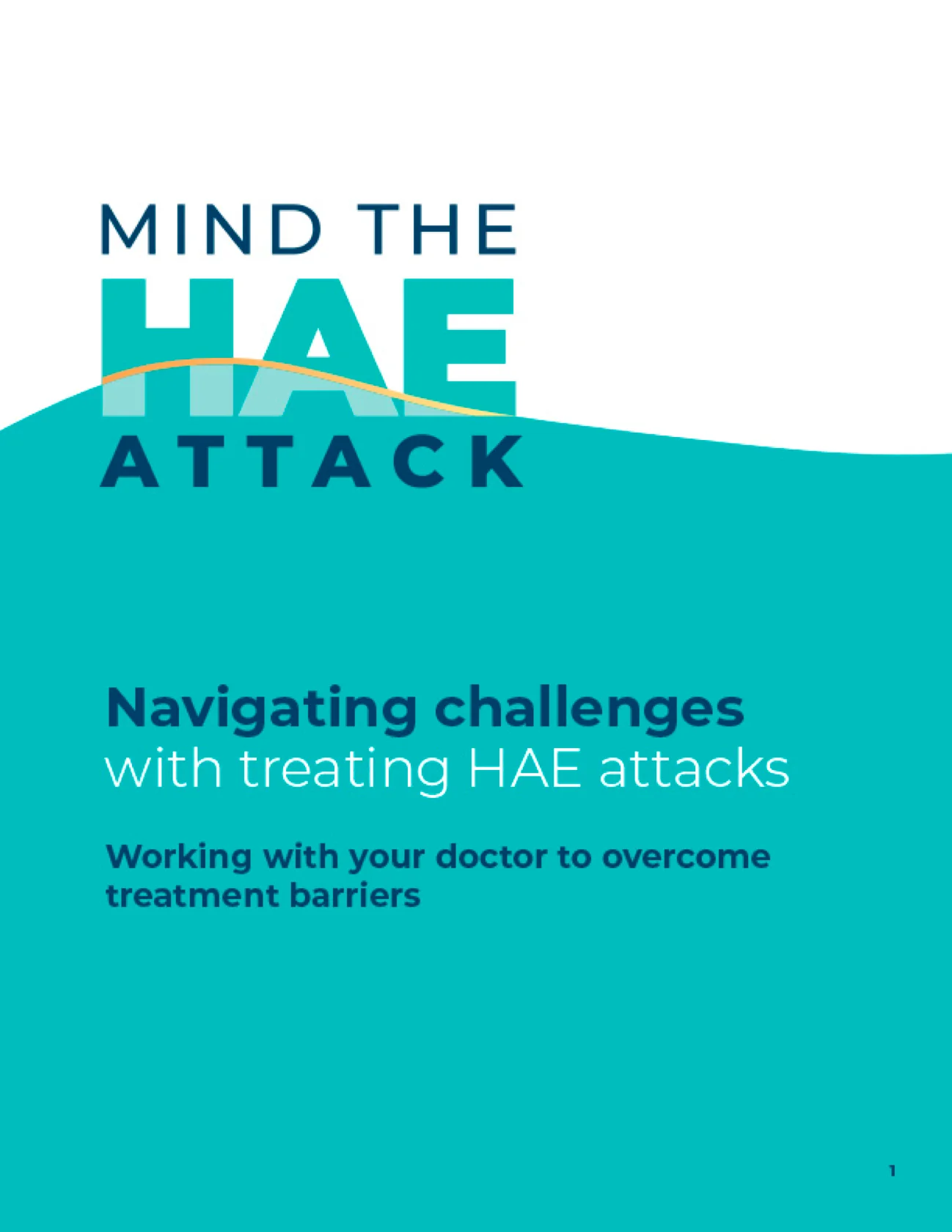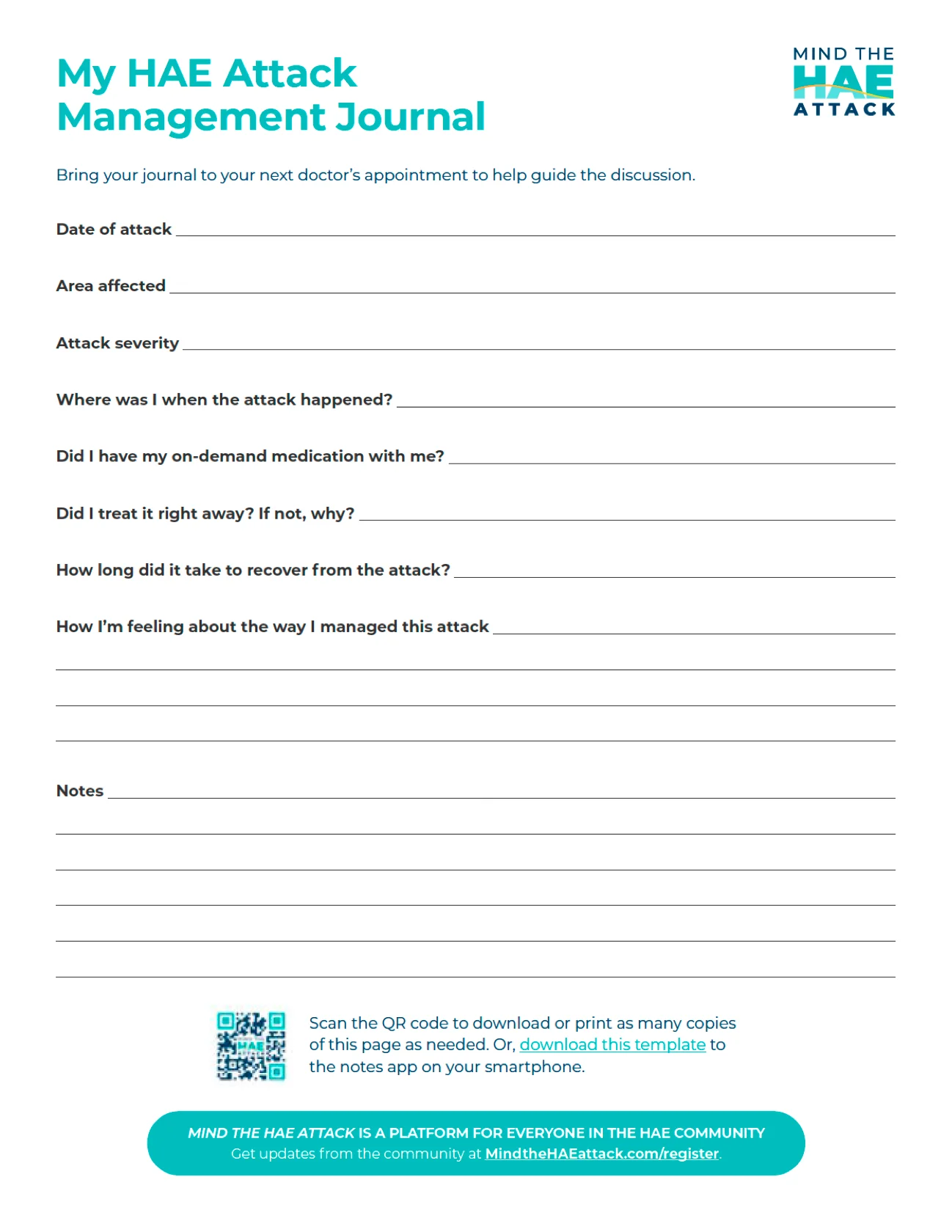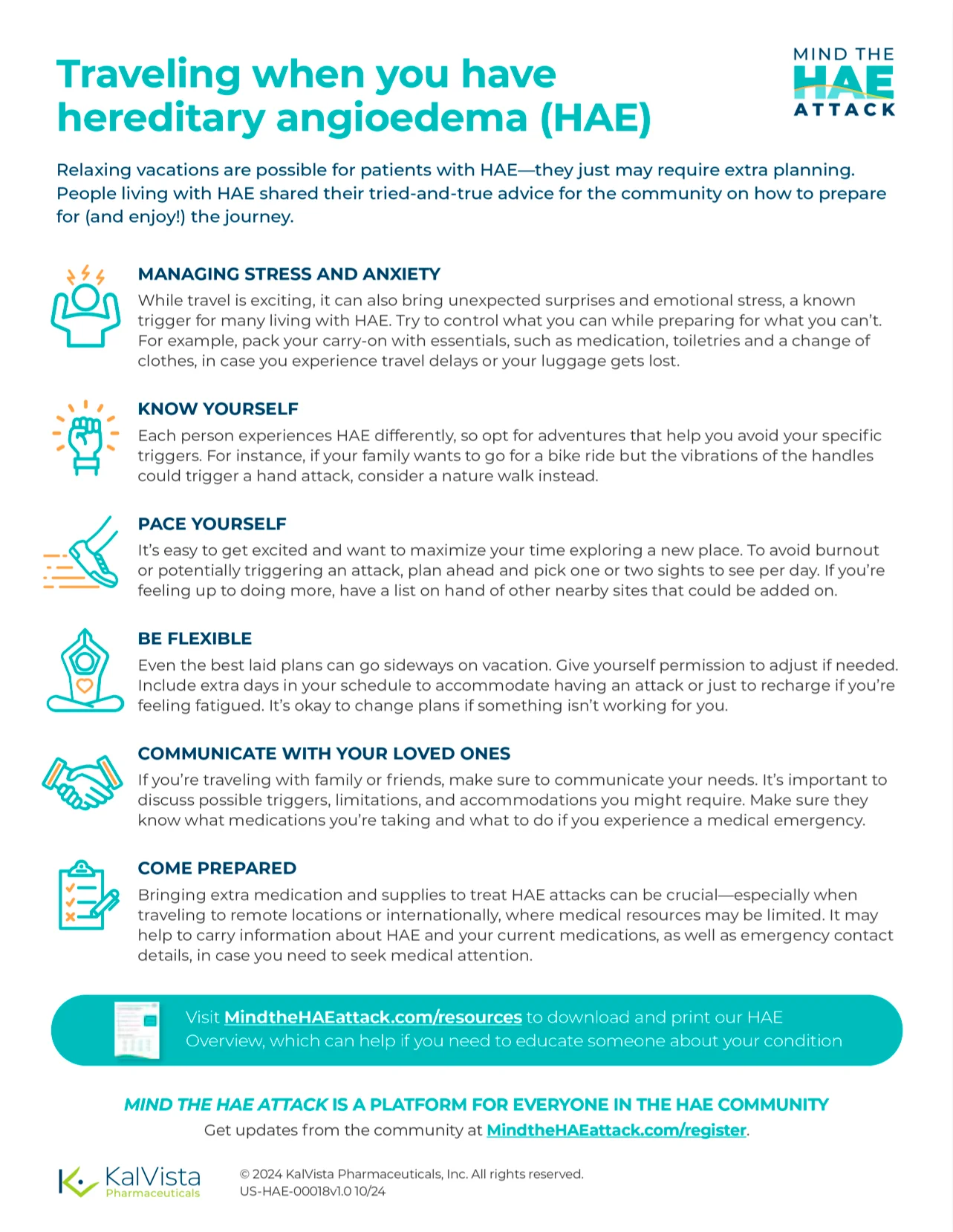Frequently Asked Questions
Answers to common questions about HAE attack treatments and the HAE Attack Journey Survey.
What is hereditary angioedema (HAE)?
HAE is a rare condition that causes swelling under the skin, also known as attacks. There are 3 types of HAE. HAE Type I is the most common. Get an HAE overview sent to your inbox to learn more.
WHAT ARE THE SIGNS AND SYMPTOMS OF HAE?
The most common sign of HAE is having unexplained swelling attacks
in different parts of the body. These could be HAE attacks.
Swelling from HAE is not due to allergies, and cannot be treated in
the same way as an allergic reaction.
Unexplained abdominal pain from HAE attacks in the stomach can
sometimes be misdiagnosed as appendicitis, indigestion, or irritable
bowel syndrome.
Some people experience early symptoms of an HAE attack, which can
include: tightness, pressure, swelling, pain or aches, itchiness,
tingling, an overall unwell feeling, and fatigue.
People who experience these kinds of symptoms should talk to their
healthcare provider about whether HAE might be the cause.
Understanding what it's not is the first step toward the right
diagnosis.
What is an HAE attack?
HAE attacks are unique to every person, but usually occur as swelling in different parts of the body, including hands, feet, genitals, stomach, and face. In serious cases, swelling in the airway can prevent breathing and lead to death.
Attacks are sometimes triggered by emotional stress or physical trauma, but swelling often occurs without a known trigger. Even if someone is taking prophylaxis (preventative) treatment, they may still experience attacks. Those living with HAE face significant levels of anxiety which impacts their quality of life.
HOW DO I KNOW WHICH TYPE OF HAE I HAVE?
HAE diagnosis involves blood tests that measure C4 and C1 inhibitor
proteins. These tests can determine HAE type, while genetic testing
can further confirm the diagnosis.
If you suspect that you may be experiencing the symptoms of HAE,
talk to your healthcare provider about taking the necessary steps to
confirm your diagnosis and type.
Get an HAE overview sent to your inbox to learn more
about the different types of HAE.
Why is it important to treat at the onset of an HAE attack?
Studies have shown that treating at the first recognition of an HAE attack can reduce severity and shorten the length of an attack.
What is the recommended way of treating an HAE attack according to HAE Guidelines?
HAE Guidelines recommend 4 key pillars of treatment, which includes strong recommendation that on-demand medication is considered for every attack.
-
1
Keep on-demand treatment available at all times. Every person living with HAE should consistently have sufficient on-demand treatment for at least 2 attacks and carry on-demand medication at all times, even if they're taking prophylaxis.
-
2
Treat early to stop attacks from getting worse. On-demand medication should be considered for every attack and taken at attack onset.
-
3
Treat regardless of location and intensity. ALL HAE attacks are eligible for treatment, regardless of where the swelling occurs or how minor the attacks may seem at onset.
-
4
Have a personalized action plan in place. A treatment plan should be carefully developed based on your needs and through a shared decision-making process with your doctor.
Who are the people that participated in the HAE Attack Journey survey?
Participants in the HAE Attack Journey Survey were 107 people living with HAE and members of the Hereditary Angioedema Association.
About half of the people in this survey were taking prophylaxis (54), and the other half were taking on-demand treatment only (53). The gender breakdown was 21 male and 86 female participants. Age groups in this survey included 56 people who were younger than 40 years old and 51 people who were 40 years or older.
What were the key findings from the HAE Attack Journey survey?
The HAE Attack Journey Survey showed that people living with HAE:
-
Continue to have attacks even if they are taking prophylaxis
-
Go through a decision-making process that results in delayed treatment
-
Have prolonged attacks and longer recovery, resulting in significant physical and psychological burden
Where can I find more information about the HAE attack burden and treatment for HAE attacks?
Additional information can be found in the Resources section.
References: 1. US Hereditary Angioedema Association. What is Hereditary Angioedema (HAE)? Accessed July 25, 2023. https://www.haea.org/pages/p/what_is_hae 2. Betschel S, van Kooten S, Heckmann M, Danese S, Goga L, Guilarte M. Remaining burden of hereditary angioedema (HAE) attacks despite modern long-term prophylaxis. Abstract presented at: EAACI 2023 Hybrid Congress, June 9-11, 2023; Hamburg, Germany. Allergy. In Press. 3. Savarese L, Mormile I, Bova M, et al. Psychology and hereditary angioedema: A systematic review. Allergy Asthma Proc. 2021;42(1):e1-e7. doi:10.2500/aap.2021.42.200073 4. Maurer M, Magerl M, Betschel S, et al. The international WAO/EAACI guideline for the management of hereditary angioedema—The 2021 revision and update. Allergy. 2022;77:1961-1990. doi:10.1111/all.15214 5. Busse P, Christiansen SC, Riedl MA, et al. US HAEA Medical Advisory Board 2020 Guidelines for the Management of Hereditary Angioedema. J Allergy Clin Immunol Pract. 2021;1:132-150.e3. doi:10.1016/j.jaip.2020.08.046 6. Data on File. KalVista Pharmaceuticals, Inc. 2023.

Back to top

